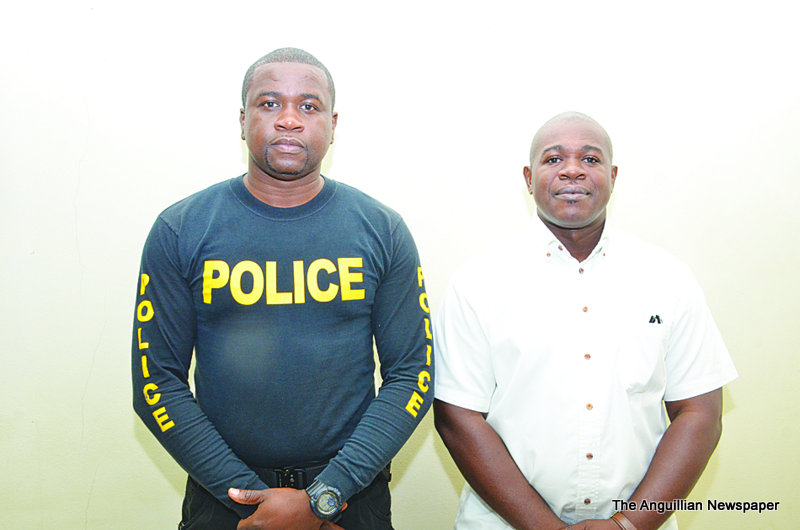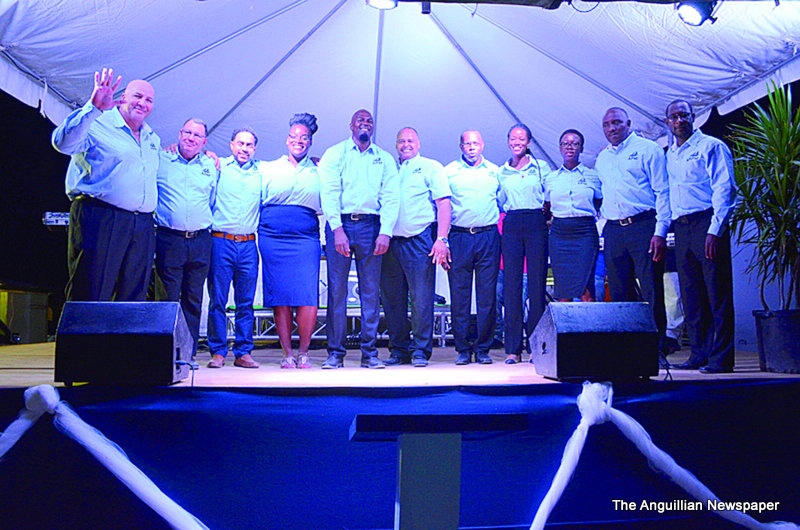
In an effort to present itself as a law enforcement organisation of self-discipline and public confidence, with a Code of Ethics, the Royal Anguilla Police Force, under the command of Commissioner Paul Morrison, has a special Professional Standards Department in operation.
It is currently manned by Detective Sergeant Edison Charles, the Supervisor, who is also a firearms trainer – and Detective Constable Godfray John. Speaking in the absence of the Supervisor, who was conducting a training session, Constable John told The Anguillian newspaper:
“This department deals with complaints about police officers from members of the public, as well as internal discipline matters involving the officers,” Constable John explained.
He was questioned why was it necessary to set up such a department.
“Our police officers must be accountable for their behavior regarding how they conduct themselves,” he replied. “In the past a lot of infringement has happened, and as a result members of the public have been complaining of not hearing anything concrete as to how these matters are being dealt with. For example, a person may complain that he or she made a report to the police but have not received any feedback as to how these matters have been dealt with. It is for this reason that the department has been set up so that these matters can be properly addressed.
“The department came into effect in December 2018 and by January 2019 it had a written policy to guide its operations. The department’s function is to receive reports from the public against police officers, and in order to protect their identity an email address and a telephone line have been set up specifically for this department. It is personalised so that nobody can see what is going on. Everything is confidential so any reports coming in will only be seen by persons working in this office.”
Constable John was asked about the functioning of the department since its creation. His reply was:
“From December 2018 to presently, numerous reports have already been received at the department – and disciplinary matters have also been heard. Officers have been charged and even dismissed from the force. The department has proper records as to how these matters have been conducted and we are able to show, in a statistical form, how this is done and the amount of data collected so far.”
Just how a complaint from the public is handled? he was quizzed.
“It goes through an investigation process, just like any other matter, to see how much evidence surrounds the incident,” he explained. “If there is a case where a police officer is to be disciplined, the matter will be initiated along with a tribunal to deal with it.”
How many officers have so far been disciplined?
“The disciplinary actions have taken different shapes,” he pointed out. “There are verbal and written warnings and there are suspensions and dismissals. Some thirty officers have gone through the process. All were not disciplined per se. Some of them were exonerated which means that the reports made against them were either false, or there was not sufficient evidence that they did something wrong.”
What were some of these complaints?
“The most prevalent complaint was incivility where officers might not have been tolerant – or show some form of rudeness,” he responded. “There were cases of owing money, harassment/annoyance. We are presently dealing with two cases of corruption which are under investigation. There are also cases of failing to comply with case file policies in terms of how some police officers conducted their investigations; and there are also domestic disputes between officers and their spouses or girlfriends. In addition, there are cases of theft where officers were charged and dismissed from the force.” He specified that those cases of theft were all internal matters.
According to him, news of an internal incident is expected to break shortly. He said: “It is a matter where an officer just left the work – just walked off the job without saying anything. It is still under investigation so you can’t write about that yet.” Well, there is no harm in The Anguillian mentioning it in passing.
Meanwhile, the Police Force has a Code of Ethics which Constable John readily made available. “The Policing Strategy 2016/2019 speaks to the Police Code of Ethics and outlines ten standards as how a police officer should conduct himself or herself,” he stated.
The Code of Ethics is as follows:
• Honesty and Integrity. I will be honest and act with integrity at all times, and will not compromise or abuse my position
• Authority, Respect and Courtesy. I will act with self-control and tolerance, treating members of the public and colleagues with respect and courtesy. I will use my powers and authority lawfully and proportionately, and will respect the rights of all individuals
• Equality and Diversity. I will act with fairness and impartiality. I will not discriminate unlawfully or unfairly
• Use of Force. I will only use force as part of my role and responsibilities, and only to the extent that it is lawful, necessary, proportionate and reasonable in all the circumstances.
• Orders and Instructions. I will, as a police officer, give and carry out lawful orders only, and will abide by Police Regulations. I will give reasonable instructions only, and will follow all reasonable instructions
The other five standards of the Code of Ethics are:
• Duties and Responsibilities. I will be diligent in the exercise of my duties and responsibilities
• Confidentiality. I will treat information with respect, and access or disclose it only in the proper course of my duties
• Fitness for Duty. I will ensure, when on duty or at work, that I am fit to carry out my responsibilities
• Conduct. I will behave in a manner, whether on or off duty, which upholds and demonstrates these standards – and the values – of the police service so as to ensure all aspects of public confidence in policing without exception
• Challenging and Reporting Improper Behaviour. I will report, challenge or take action against the conduct of colleagues that has fallen below the standards of professional behaviour and/or which may not be consistent with the shared values of the Royal Anguilla Police Force.
If all of the above standards, set out in the Code of Ethics, are adhered to, Anguilla’s police officers would be among the best professional law enforcement personnel anywhere. Further, the Police Department of Professional Standards will have no headache to discipline its officers; there may be no need for its existence; and the police and the public will live happily thereafter.
At the moment, the department is a good idea. The two officers having responsibility for it are doing an excellent but difficult job, and it evidently welcomed by the Anguillian public.








